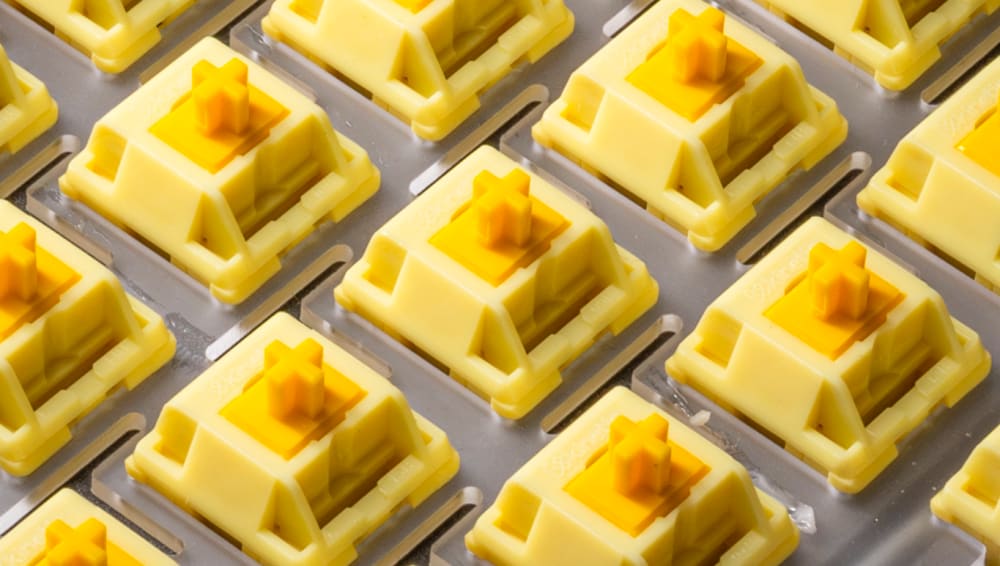Preston S.
May 10, 2025
•5 minutes
Why Mechanical Keyboards Feel Better Than Membrane
Discover why mechanical keyboards feel better than membrane with tactile feedback, durability, customization options, and improved performance. Your fingers will thank you!


Coffee Shop PBT Keycaps on Mechanical Keyboard - installed on 80% keyboard
There's a moment, if you've ever typed on a mechanical keyboard, when everything just... clicks. Literally and figuratively. The first time you feel that snappy tactile bump or buttery smooth keypress, something shifts. Membrane keyboards just can't provide the same feel, but why can't they? Let's talk about it.
You Can't Fake That Feel
Membrane keyboards rely on squishy rubber or silicone domes that collapse like wet paper, while mechanical switches are made of different metals and plastics and use a spring to provide feedback and resistance whenever you press a key.


HMX Latte Mechanical Keyboard Switches
The result? You're not second-guessing whether a key registered. Your fingers learn the rhythm. It becomes fluid, intuitive, and even a little addictive. On a membrane board, that feedback is vague at best due to its usually lackluster feedback. It's like pressing into a sponge: soft, silent, and entirely forgettable. With mechanical switches, each key press feels deliberate and decisive. So, whether you're typing for hours or gaming deep into the night, that difference stops being a luxury and becomes more of a requirement, as you can start to develop fatigue if you put too much strain on your hands.


HMX Butter Mechanical Keyboard Switches
Built to Survive Your Grind
Let's talk toughness. Mechanical keyboards are built to last. Keyboard switches are designed to endure anywhere from 50 to 100 million keystrokes! So, whether you're smashing through your favorite rhythm game or getting work done, a mechanical board will always keep up and stay consistent.
On the other hand, membrane keyboards degrade rather quickly. First, it's the spacebar, then the "E" key needs an extra tap, and before long, you're smashing keys just to make them work. They wear out from the inside, and when they go, they're gone. There is no saving it, but with mechanical boards, everything's modular, fixable, and upgradeable. A well-maintained keyboard can look and feel like new years after you buy it. That's real value.


Stars80 V2 Mechanical Keyboard
Make It Yours (Seriously)
Mechanical keyboards don't just work better, they look and sound better too. The sky is the limit when it comes to customizing mechanical keyboards! You can change switches, swap keycaps, tune stabilizers, dampen sound, or build your own board from scratch using individual parts! Want your board to match your gaming setup or your office aesthetic? Go wild with RGB lighting, artisan keycaps, or cases made from wood, aluminum, or acrylic.
Membrane keyboards? What you buy is what you get. And usually, what you get is cheaply made plastic and regret.


Lucky65 V2 Mechanical Keyboard
Sound & Performance
Let's not overlook the acoustics. Mechanical keyboards give you a full audio spectrum to play with, from stealthy silence to ASMR-level "thocky" sounds. Compare that to membrane keyboards, which mostly just sound like a mushy mess.
Mechanical keyboards aren't just better sounding, they perform better as well. You get faster actuation, lower resistance, and better precision as well. You don't have to bottom out every key, and your fingers work less for better results. If you're into competitive gaming, mechanical keyboards offer real tactical advantages. Anti-ghosting, N-key rollover, hall-effect switches, and ultra-low latency polling rates mean your inputs are faster and more accurate, even under pressure.
Are Membrane Keyboards Really That Bad?
Not necessarily. They're cheap, they're light, and they get the job done. If you are doing heavy workloads that require long hours of typing, consider upgrading to a mechanical keyboard, as your wrists and hands will thank you in the long run.
Final Word? Just Try One
If you've never used a mechanical keyboard, this might all sound like overhype. But it's not. The difference is real, and you don't need to drop $300 to feel it.
There are amazing entry-level boards from brands like Keychron and Akko that'll blow your membrane keyboard out of the water at affordable prices. Need something even more portable? Try a 60% or 75% layout. Want a full number pad? There are options for that, too. There's truly a mechanical keyboard for everyone.
So check out what Kinetic Labs has in store below. Because once you upgrade, you won't want to go back.


Lucky65 V2 Black Mechanical Keyboard
Options to Consider
- Kinetic Labs GMK67 65% Mechanical Keyboard
- - Plastic Case for Portability
- - Wireless Capabilities
- - Gasket Mounted for Soft/Bouncy Typing Feel
- - Hot-swap PCB (No Soldering Required!)
- Madlions Mad60/68 Hall-Effect Gaming Keyboard
- - 8000Hz Polling Rate (Zero-Latency Gaming)
- - Hall-Effect Switches (Adjust Actuation of Switches)
- - Hot-Swap PCB for most HE switches
- Lucky65 V2 Keyboard
- - 65% Budget keyboard
- - Wireless Capabilities
- - Gasket Mounted for Soft/Bouncy Typing Feel
- - Hot-swap PCB (No Soldering Required!)